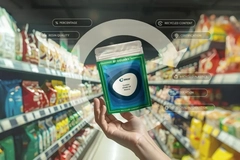Constantia Flexibles’ VP calls for revamped EU recycling regulations to boost flexible plastics circularity

22 Nov 2022 --- Constantia Flexibles calls on Europe to create clearer and more lenient parameters on recyclable materials so as to not limit innovation. The company is also asking the EU to enact and update universal regulations that promote a circular economy.
Marc Rademacher, executive vice president of consumer commercial at Constantia Flexibles, gives PackagingInsights an inside look into the company’s materials and its strides toward optimized flexible packaging.
The company works with hard-to-recycle flexible plastic packaging solutions. While flexible packaging serves a vital protection purpose, it faces many issues with recyclability since it cannot be collected in curbside bins due to the challenges of its lightweight nature.

Constantia Flexibles requests “an overarching guideline that is updated regularly and promotes the circular economy for all packaging formats, i.e., both to create incentives for the transformation to recyclable packaging and ensure the corresponding infrastructure to collect, sort, and recycle packaging developed according to Design-for-Recycling criteria,” says Rademacher.
 Constantia Flexibles’ Marc Rademacher, speaks with us on his requests for the EU to revise its recycling and material legislation. Flexible packaging
Constantia Flexibles’ Marc Rademacher, speaks with us on his requests for the EU to revise its recycling and material legislation. Flexible packaging
Rademacher explains that flexibles are valuable materials for protecting food from expiring, preventing waste and linking it to environmental sustainability functions. “Flexible packaging primarily protects filled goods which help to protect the environment by preventing and delaying the spoiling of these valuable products.”
“Compared to other packaging options, flexible packaging has the advantage of being very lightweight. In this context, more than half of the food in Europe is packaged in flexible packaging, while flexible packaging accounts for only 1/6 of the total packaging material used – in [metric] tons.”
Regarding the creation of new products for collaborations, Rademacher says, “our focus in this context is on more sustainable monomaterials, such as PE, PP, aluminum or paper. We use life cycle assessments to identify which option can provide the lowest environmental footprint.”
Recyclability issues
Flexible plastics such as grocery bags and bubble wrap are not recyclable in curbside bins. This is because the material’s thinness causes it to be easily caught in recycling conveyor belts, shutting down whole systems.
“On the transformation journey to more sustainable substrates, our customers sometimes face challenges in terms of runability of the material on their packing lines.” Yet, the company takes on “such challenges and can provide support to achieve superior line performance despite new and innovative materials.”
In 2020, flexible plastic packaging represented 22% of all UK consumer plastic packaging. However, only around 8% of this material was recovered for recycling, according to Recoup’s household plastic collections survey 2021. Europe also only has a 23% recycling rate for PE films.
Governmental call to action Flexible packaging, while serving vital food-saving functions, has low recyclability rates.
Flexible packaging, while serving vital food-saving functions, has low recyclability rates.
When addressing European legislation, Rademacher comments, “our industry shares the ambitious objectives of the EU Green Deal and Circular Economy Action Plan 2.0. We are fully engaged in taking action to bring packaging sustainability to the next level. In alignment with the ambitions of the Green Deal, large amounts of packaging on the European market will have to meet recyclability and reusability criteria.”
“A minimum recycled content for plastic packaging is also currently expected. The key challenges here are clear and workable definitions and requirements,” he continues. The call for updated definitions is to optimize materials’ recyclability and create more explicit guidelines on what is and is not recyclable while giving room for innovation.
“Precise requirements have the advantage throughout the value chain of promoting the transformation to sustainable, recyclable solutions on a large scale. However, if the definition of recyclability, is too narrow and rigid, it may freeze the status quo and create unnecessary hurdles for innovation.”
Shifting to sustainability
Revised rules for recyclability will allow for more creation of materials that can lead to a more circular economy.
“The main challenge is transforming today’s tailor-made solutions, often consisting of multiple materials, into recyclable alternatives ready for the future while maintaining their key performance features. A transformation from multi-material to monomaterial structures.”
Constantia Flexibles has been moving toward more ecological flexible packaging solutions with its “more sustainable ‘Ecolutions’ product line, launched in 2018, gaining significant traction across various applications,” concludes Rademacher.
Next month, PackagingInsights will speak with experts from Constantia Flexibles, UBQ Materials and Innova Market Insights in an exclusive webinar Food Waste Fighters: Packaging for the Climate Change Age. Readers can register for the event here.
By Sabine Waldeck












